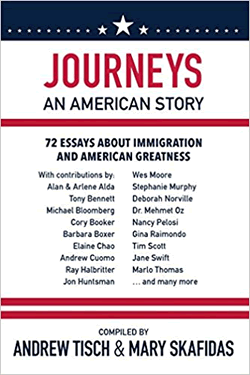BOOK REVIEW
Journeys: An American Story
Reviewed By Jacob M. Appel, MD, JD
 Journeys: An American Story
Journeys: An American Story
By Andrew Tisch and Mary Skafidas
RosettaBooks; 360 pages
“While Americans have a long and ignominious history of barricading the doors,” write co-authors Andrew Tisch and Mary Skafidas in their introduction to Journeys: An American Story, “we have an even longer and more glorious history of tearing those barriers down.” At a time when the zeitgeist seems to favor xenophobia and one of the nation’s grand political parties has been coopted by the darkest forces of nativism, these two senior executives at Loews Corporation have drawn upon a network of friends, acquaintances and strangers to collect seventy-two vibrant and distinctive essays that both capture the immigrant experience and remind readers of the myriad ways in which immigration benefits our nation. From the inclusion of Emma Lazarus’s poem, “The New Colossus,” on page one, to an appendix that allows readers to “write your own story,” this is a volume with a spirited mission. Unlike many books with an agenda, however, it is also a fascinating and highly engaging read.
The range of stories included is itself a tribute to the compilers efforts. Some are household names like singer Tony Bennett, former House Speaker Nancy Pelosi and New York Governor Andrew Cuomo. Others are successful professionals like Jamaican-born economist Peter Blair Henry, Dean Emeritus of New York University’s Stern School of Business, or members of the working class like car service driver Mario Neiman, whose ancestors came to New York from Odessa with a detour through Buenos Aires. In one inspiring yet unsettling essay, a Palestinian refugee quotes Emerson and pays tribute to Samuel Adams, but uses the pseudonym “Mohammed” to protect his own identity.
The styles vary as much as the stories. Actor Alan Alda approaches the challenges of the immigrant experience with humor, writing, “But not long after they got off the boat, my Irish ancestors were asked to ignore ads for employment, the Italians were asked to take a bath, and all of them were asked to stop having so many children.” In contrast, his wife, Arlene, a photographer of Jewish descent, writes movingly of her relatives who inhabited the Mayflower building in the Bronx, a “beehive of working-class and middle-class Jews,” and also of relatives left behind in Europe who later perished in the Holocaust.
Tisch and Skafidas sort the narratives into categories including stories of love, survival, and trailblazing. They also include one indigenous American, Ray Halbritter of the Oneida Indian Nation, and multiple institutions that have contributed to the immigrant experience including the New-York Historical Society, where Tisch first originated the idea for the book. Yet the volume’s most powerful section, especially in light of the current political climate, contains five narratives of undocumented immigrants. What makes these accounts so striking is not just the poignancy of each human story, but the sheer variety of experiences that defy stereotypes of immigrants without legal status: We are introduced to the father of a Jewish obstetrician who cannot cross Niagara Falls on a family vacation; a Greek aunt who lives under aliases for fear of deportation; a Persian engineer who flees the Iranian Revolution and is abetted by a sympathetic embassy clerk in Denmark; and a refugee from the Colombian Civil War who, to the horror of her teacher, writes her first essay in fourth grade on the Navajo genocide.
The central theme of the collection is the greatness of the American experience and the value of the immigrant contribution. Many of the essays independently arrive at very similar observations. Hungarian-born football star Peter Gogolak writes of the welcoming nature of the American people: “If you work hard and succeed in this country, nobody cares where you came from.” A’Lelia Bundles, the biographer of cosmetics mogul Madame C. J. Walker and also her great-great-granddaughter, echoes these sentiments: “We are our ancestor’s hopes and dreams. As Americans, we honor them by opening our hearts to those who bring new visions and aspirations across our borders and onto our shores.” Linda Hills, Andrew Carnegie’s great-granddaughter, says of her illustrious forebear: “Andrew was quick, he was dedicated, he had a strong work ethic, he was filled with passion to do the best he could, and he keenly felt responsibility to his family—traits common to many immigrants, past and present, who leave their homelands under duress to seek a new life and new opportunities in America.”
The essays are rife with fascinating and unexpected details. Former Congresswoman Gabby Giffords, through astronaut husband Mark Kelly, reports that her father, Gif Giffords, “was a salesman who peddled harmonicas, even though he couldn’t play a note.” Arlene Alda’s entire college education at Hunter cost her family $12.00. Transportation Secretary Elaine Chao’s mother, Ruth Mulan Chu Chao, was the first woman to have a building named after her at Harvard. Physician Richard Levine attends college at Tufts after a life-changing campus tour delivered by Antarctic explorer Robert Nichols. Yet as unique as each story is, they also all belong to a universal story of transformation and acceptance. As Korean-born Angela Warnick Buchdahl, the nation’s first Asian-American rabbi, observes: “What I find so surprising is how many different Americans, in some way, feel like a stranger....” And yet—at least until now, and despite some obstacles along the path—America has embraced those strangers, slowly transforming them into neighbors and friends and family.
If a book ever represented the best that is our nation, it is Journeys. Linda Hills (Andrew Carnegie’s great-granddaughter) best encapsulates the spirit of this wondrous volume: “The next Andrew Carnegie may come from Africa, the Middle East, Asia, Europe, Australia, South America or an island somewhere else. However, he or she will not come if we close our doors, and we will be poorer for it, and truly neither we, nor the world, will be safer.” #
